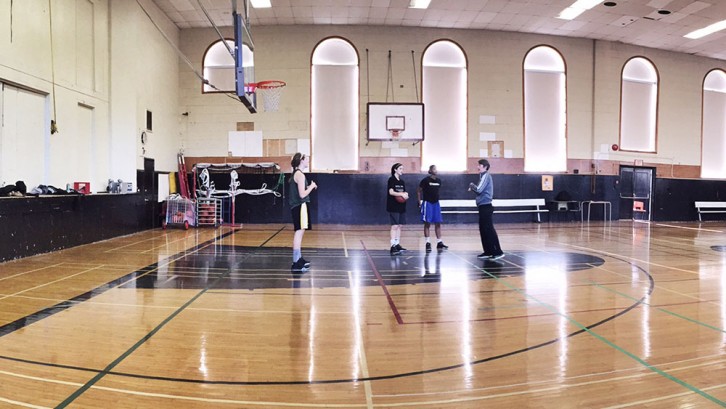Sports
Halifax varsity sports teams have few female head coaches
A 2013 national study says females made up 17 per cent of all varsity sports head coaching positions, yet only 5 per cent in Halifax

caption
Anna Stammberger (right) coaching three of her Dalhousie women's basketball team members.
caption
Anna Stammberger (right) coaching three of her Dalhousie women’s basketball team members.Halifax has 41 men’s and women’s varsity sports teams at four of its universities. Only two of these teams have female head coaches.
Anna Stammberger is one of these two coaches. She’s been the head coach of the Dalhousie University’s varsity women’s basketball team for seven years.
Stammberger wonders why the numbers are so low.
“It is a concern,” she said. “I think women have a lot to offer all professions, so I don’t see why they wouldn’t be better represented as head coaches.”
Stammberger said some of it might have to do with the need for support when it comes to family life. With schedules that are arranged around student classes, a lot of the job is evenings and weekends. This lifestyle is hard to manage for coaches with young families.
“There’s got to be some type of extra support,” Stammberger said. “And I think people who don’t have that extra support can’t go on coaching because their children or home life will suffer.”
Stammberger said Dalhousie offers support. Her team has female assistant coaches with young children. She said sometimes the coaches have to bring children to practice and they travel with them. When this is the case, they bring on an extra manager or trainer who can help with child care.
Stammberger said she thinks that to have more female coaches, support is needed from universities, government and sports associations.
Tim Maloney, Dalhousie University’s athletic director, said coaching is a hard job for anyone with a young family.
“None of our [head] coaches right now have young families,” he said. “If you have a young family, it can be really challenging. Coupled with that, in Canada, coaching jobs at this level typically don’t pay a ton of money. Our male coaches face the same [problem] when it comes to compensation.”
Maloney said most athletic directors he knows are looking for female coaches, but experience and qualifications come first.
“No one’s in a position to hire someone that has no experience or doesn’t have the credentials,” he said. “All else being equal, I think most athletic directors’ preference would be to have more female coaches.”
June Lumsden, athletic director at Mount Saint Vincent University, said they face the same problems. They currently have six varsity teams with no female head coaches.
“We do strive to find female head coaches, but it has been difficult to fulfill,” she said.
Lumsden said they are fortunate because they do not have a high turn over rate in their coaches, but they’re still working towards seeing more female coaches in the future.
Nationwide Problem
This is not just an issue in Halifax. It’s nationwide. In a study conducted in 2013 by the University of Toronto’s Centre for Sport Policy Studies, it was calculated that only 17 per cent of head coaches of varsity teams across Canada were female.
Last spring at the Canadian Interuniversity Sport meeting that brings all Canadian athletic directors together, Maloney said the topic of female coaches was discussed. He said it’s something they’re all paying close attention to.
“People recognize it’s an issue,” Maloney said. “Now we have to get to the root causes and some things we can do differently to make it more attractive. I think there’s still a lot of unanswered questions that need some research and real thought behind them.”
How do we change it?
June Lumsden said they are looking at up-and-coming coaches.
“We are working on that challenge through coaching development and mentoring our present assistant coaches in [the] hopes that they will have the experience, coaching credentials ?and certification when these positions open up again,” Lumsden said.
Maloney agrees young coaches coming through the ranks should be the future.
“I think we need to talk to young female coaches and really understand what’s going to make this an attractive and sustainable profession for them long term,” he said. “Right now, I don’t think it’s as attractive and conducive for women as maybe men.”

